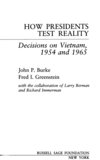I offered my arguments for plod over passion awhile back. Bleader, if you missed it do not pass Go until you have. It is on 12 August 2008. Click here https://theory-practice.sydney.edu.au/wp-content/uploads/2019/08/2008/08/professionalism_over_passion_a.html
————————————————————————————————————————————–
Reading How Presidents Test Reality(1989) by John P. Burke and Fred I. Greenstein offers some insight into passion and plod.  This book is a study of U.S. presidential decision making in two crises concerning Vietnam. The first crisis is the 1954 collapse of the French colonial regime and the pressure on the Eisenhower Administration to do something to stem the red tide of communism. Eisenhower did almost nothing. The second is the 1965 Gulf of Tonkin, Pleiku incidents that heralded the collapse of the South Vietnamese regime and the pressure on the Johnson Administration to do something to stem the red tide of communism. Johnson did almost everything.
This book is a study of U.S. presidential decision making in two crises concerning Vietnam. The first crisis is the 1954 collapse of the French colonial regime and the pressure on the Eisenhower Administration to do something to stem the red tide of communism. Eisenhower did almost nothing. The second is the 1965 Gulf of Tonkin, Pleiku incidents that heralded the collapse of the South Vietnamese regime and the pressure on the Johnson Administration to do something to stem the red tide of communism. Johnson did almost everything.
———————————————————————————————————————————————–
The book is based on a meticulous study of official and personal diaries and reports produced in the two cases, as well as extensive interviews with participants, and very large doses of analysis, combined with published works.
——————————————————————————————————————————————-
In one case the president insisted on scrupulous staff work that tested every fact and proposition relentlessly long before it was even considered in the White House. In one case the president was cool, detached, and clinical. In one case the president demanded that every proposition be debated in full by a variety of experts long before it came to him. In one case the president felt he had nothing to prove and was confident in his ability to persuade others to accept his conclusion, whatever that might be. This president demanded that experts explain and justify their arguments and conclusions in a way he could understand. In one case the president repeatedly asked for disagreements to be stated now. In one case the president resisted the pressure to act immediately.
——————————————————————————————————————————————-
In the other case the president wanted every allegation sent straight to him unmediated. In the other case the president was hot, involved, and passionate. In the other case the president gathered a very small number of trusted advisors around him, numbering between three and five, and only spoke to and listened to them on this subject. They emerged because they tried to influence him, not because they were best suited to the subject, and he seemed to like what they said. Others, perhaps better placed to advise, were never asked to do so. In other case the president was unsure of his own worth and not confident he could persuade others of his conclusion, which he seems to have settled on almost from the very start. This president deferred to others – generals and officials – and accepted their word for fact. In the other case the president repeatedly called for unanimity. In the other case the president micro-managed everything, acting immediately and repeatedly.
———————————————————————————————————————————————–
See if you can guess which is which….. Too easy?
——————————————————————————————————————————————–
Lyndon Johnson is the passionate man who feels the pain of the casualties, for whom American prestige is palpable, who must be engaged right now. To wait is failure. Not to act is worse than failure. He had field reports relayed to him personally by telephone, on one occasion at 1:15 am, at 3:05 am, at 3:20 am, at 4:00 am, at 5.05 am, before rising at 6 am and shortly thereafter escalating the bombing of North Vietnam and he picked the targets himself. There was not a single moment of thought or discussion given to end-game, the longer term goal.
—————————————————————————————————————————————-
The contrast is Eisenhower who went golfing while the Planning Board debated options, and intelligence agencies tried to discredit each others’ conclusions. End game was always the first criterion. What we want? A stable and friendly regime. Is there anything we can do to achieve that? Very little. Then let’s do that: very little. Johnson tried everything with great energy and intensity, call that passion, to no purpose.
